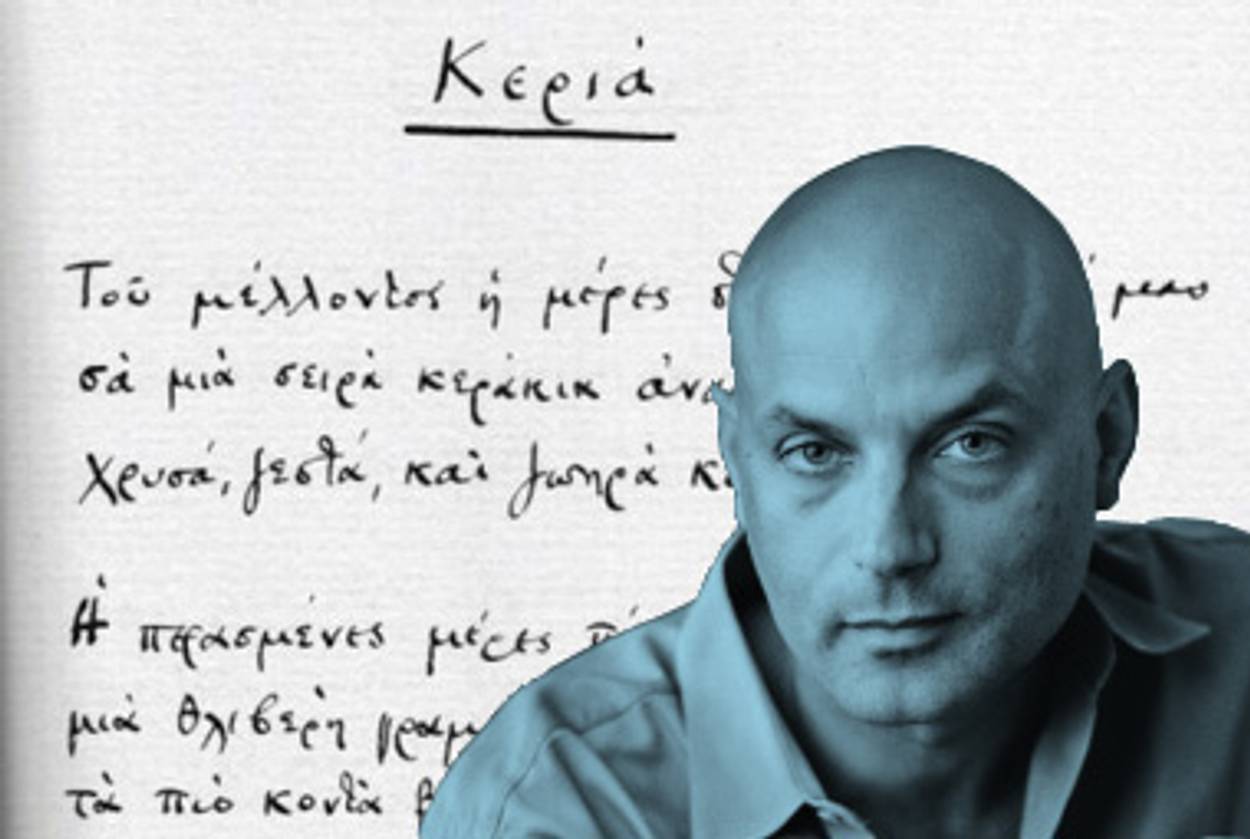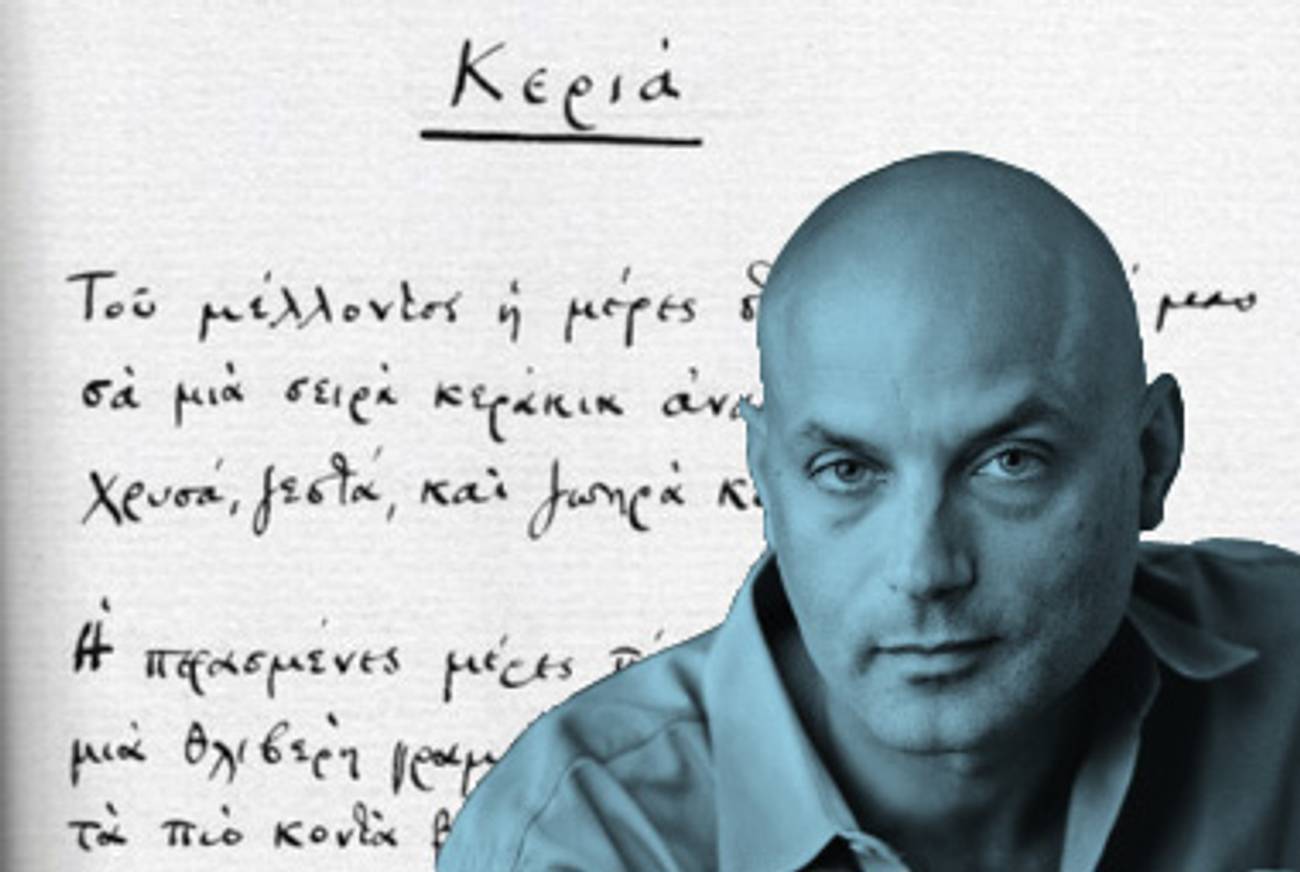Rooted Cosmopolitanism
How Daniel Mendelsohn’s translations from the Greek illuminate his Jewishness




In the introduction to How Beautiful It Is And How Easily It Can Be Broken, a collection of essays due out in paperback this month, Daniel Mendelsohn describes himself as a journalist, but he does not write like one. His sentences are often long and sinuous and his style changes with each of his books. He can be urbane, surprisingly sentimental, analytical, prolix, aphoristic, oblique, and sometimes maddeningly obvious.
Mendelsohn likes complexity. His most famous work to date, The Lost, is constructed of elegant narrative swirls. The same goes for his first book, The Elusive Embrace, a meditation on the fragility of identity that manages to juxtapose discussions of Greek tragedy with autobiographical reflection. Given all this, it makes sense to think of Mendelsohn as an essayist in a more traditional mode—a man with interesting thoughts, good turns of phrase, and the enviable ability to tell a story.
But most essayists do not have doctorates in classics nor would they be able to pull off Mendelsohn’s subtle translations of C.P. Cavafy, that most subtle of modern Greek poets, in C.P. Cavafy: Collected Poemsand C.P. Cavafy: The Unfinished Poems, both released this past spring. As far as I can tell, they are the best English renderings of Cavafy we’ve got.
Although it does not look consistent, Mendelsohn’s profile is not contradictory. He is gay, is fascinated by the ancient Greeks at the same time that he is deeply committed to his Ashkenazic roots. He is driven by his concern for the vulnerability of the past in the face of memory’s flaws. And, however obliquely, he is thinking through what it means to a contemporary Jew in America.
The translations of Cavafy seem to be the outliers here. On the most basic level, Mendelsohn’s interest in Cavafy, who died in 1933, turns on the poet’s homosexuality and both poets’ shared love of the Greek past. (It is not tendentious to call Mendelsohn a poet. His translations are that good.)
The surface simplicity of Cavafy’s work—it contains relatively few metaphors—is offset by its play of reference, his immersion in the history of the Hellenic. His works require annotations. It is a tribute to Mendelsohn’s narrative skills that he provides commentaries that read well. All this might sound as tedious as it is arcane, but Cavafy is also able to tell a good tale. His world consists of richly flawed characters who suffer both ironies of politics and the indignities of age with varying degrees of nobility and wit.
There are no easy choices in Cavafy’s world, although there are clearly some disastrous ones. Mercifully—for the rest of us, at least—Cavafy remains sadly amused by spectacles of human weakness. Look at the way he treats Ianthes, “son of Antonius/From a family close to the Synagogue,” who is an accomplished athlete, painter, and poet. Ianthes claims that wants to remain “of the Jews, of the holy Jews, the son.” A worthy aim, but this is 50 C.E. Ianthes—the Greek names give the game away—doesn’t remain a Jew at all. Cavafy dispatches him elegantly, if laconically: “the Hedonism and Art of Alexandria/made the boy into their devotee.” The capital letters there are killers. In Alexandria, pleasure and art are not abstractions. They are proper nouns.
Alexandria—the capital of Cavafy’s universe—is the perfect setting for such seductions. Polyglot, louche, famous for a magnificent library and the scene of some spectacular defeats, Cavafy’s late colonial Alexandria stands for the faded opulence of over 2,000 years of history. Alexandria was also unrepentantly cosmopolitan. As the novelist Lawrence Durrell put it: “Five races, five languages, a dozen creeds: five fleets turning through their greasy reflections behind the harbour bar.”
Perhaps because he did not mature as a poet until his 40s and perhaps because his chief subject was the past, Cavafy was a poet of memory. He constantly reminds us of its weakness:
That August—was it August?—evening…
I can just recall the eyes: they were, I daresay, blue…
Ah yes, blue: a deep blue, sapphirine.
This is not a love poem as much as it is an old aesthete’s recollection of recollection itself.
Mendelsohn too is a connoisseur of retrospection. As a friend tells him in The Lost, he has spent his whole life looking back. He is the family historian, a tireless interviewer of the elderly, a man devoted to dead languages. In his exhaustive—truth be told, his obsessive—research, he anticipates the past the way that some people look forward to the future. He is more than a little susceptible to what he calls a “mournful contemplation so flawless, so crystalline, that it can, in the end, immobilize you.”
The Proustian whirls and dips of his writing save him from the appearance of immobility. The Lost could have been a straight-ahead history of his family and the Holocaust. It isn’t. Instead, Mendelsohn has written an account of trying to recover some details of the death of his great-uncle’s family in Bolechow, a little town in what is now Ukraine. By the end of the book, it becomes clear that the survival of the memory of his family depends on small wisps of imperfect recall. The losses Mendelsohn enumerates are many and almost all of them are complete.
One of the appeals of The Lost is that it attempts the impossible. Mendelsohn writes that “as we know, everything, in the end, gets lost.” Well, sure. What could be more obvious? Nevertheless, his statement is saved from sheer banality by the strenuousness of his efforts to deny it. The book shows us the lengths he is willing to go to make sure that his great-uncle’s family doesn’t get completely lost. Sure, we will know very little about them—the Germans were victorious to that point—but we still know something of them. And that has to count for something.
Bolechow was a small shtetl made up of Poles, Ukrainians, and Jews, and although it was no Alexandria, it did share with Alexandria a fluent, mongrel, multilingualism that was the result of different peoples living together more or less peacefully for long periods of time. Mendelsohn’s nostalgic fascination with Bolechow is not so different from Cavafy’s immersion in Alexandria. Pre-war Bolechow was not a scene of either Hedonism or Art, but it can be called cosmopolitan in a rather specific sense. It did not boast five languages, but came pretty close. (At various points in the 20th century, it was claimed by Austria, Poland, Germany, Russia, and Ukraine.) Mendelsohn’s grandfather, the tutelary genius of both The Lost and The Elusive Embrace, was a man of many stories and almost as many languages, a scoundrel who could slip from English to German to Yiddish to Russian and beyond in the course of one sprawling anecdote. Mendelsohn keeps coming back to the image of the old Jews of his family sitting around and swapping tales that moved across languages and boundaries.
So much depends on the term “cosmopolitan.” In the late 19th century, it was a code-word for assimilation. As a principle, it allowed a Jew to transform himself into a “citizen of the Israelite faith,” and thus flee the ghetto. The ticket of admission was simple and ultimately devastating: give up all visible signs of yiddishkayt. The lure of cosmopolitanism is the snare that catches Ianthes—the cosmos one chooses is essentially goyish.
For Mendelsohn, though, cosmopolitanism represents a step beyond assimilation. He has said that being a Jew and being gay are similar in that they both pose the question of how to relate to the straight, non-Jewish majority: “The same debates rage within both cultures: should we assimilate? Should we remain outside? What are the benefits? What are the compromises involved?”
In Bolechow, as in the Alexandria of Cavafy’s time, people did not speak the single language of the majority, but the languages of each other’s minorities. This cosmopolitan solution to assimilation—a mutual recognition in spite and because of ethnic, religious, or sexual particularities—is nothing if not fragile. All nation-states require some version of assimilation, a strong identification with a dominant population and with a dominant language. Alexandria before militant Pan-Arabism and Bolechow before the Second World War were in their way holdovers from the period of decaying empires. They inhabited a space where nationalism was not yet necessary and were destroyed when it was.
This linguistic model of cosmopolitanism is therefore also a throwback. In order for it to work, you need to have a language to come back to, one that you do not share with your neighbors. This language is a version of home, a place of ethnic privacy. In André Aciman’s Out of Egypt, a memoir of life in Alexandria before the Jews were expelled, the older folks sometimes drop their letter-perfect French in favor of Ladino, either out of exhaustion or intimacy. They return to it, he writes, “with the gratified relief of left-handed people who, once in private, are no longer forced to do things with their right.” Most contemporary American Jews are right-handed.
But if we take seriously The Elusive Embrace’s insistence on the inevitable flexibility of identity, we can see cosmopolitanism as a challenge now that assimilation has largely been accomplished. What’s more, it describes the kind of life that many American Jews try to pursue. Mendelsohn’s breadth and the curve of his career might profitably be taken as an experiment in mixed affinities, as a conscious example of what it would mean to live as both a Jew and a Greek. Part of the creativity of contemporary American Jews comes from their tolerance, not only of others, but of their own identification with Judaism. So, it might be productive to argue that most Jews in the United States these days are existentially, though not linguistically, ambidextrous. The difficulty they face, the difficulty of modern cosmopolitanism, is to be an Ianthes who understands the allure of Hedonism and Art, one who lives in Alexandria but won’t leave the synagogue behind.
David Kaufmann teaches literature at George Mason University.
David Kaufmann teaches literature at George Mason University.